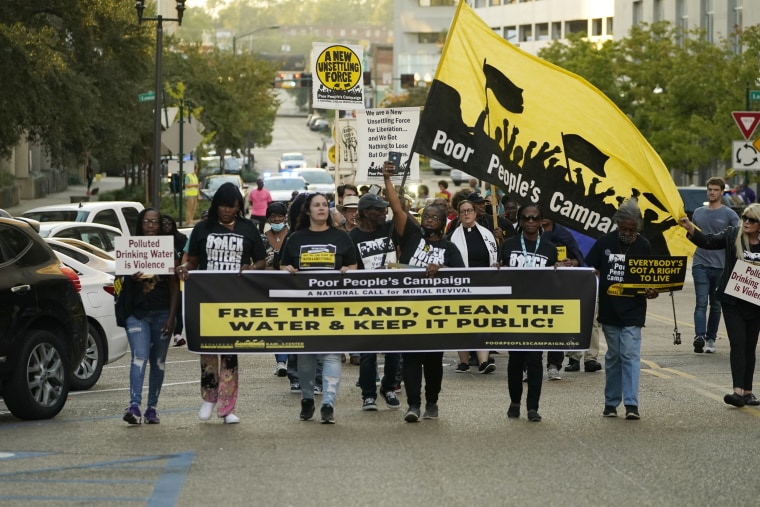Congress investigates Jackson water crisis and Mississippi’s use of federal funds
JACKSON, Miss. — Two congressional committees want Mississippi Gov. Tate Reeves to explain how the country’s poorest state is spending hundreds of millions of dollars in federal funds as its predominantly Black capital city struggles with crumbling water infrastructure.
Reps. Carolyn Maloney, D-N.Y., and Bennie Thompson, D-Miss., sent the request in a letter to Reeves on Monday as part of an investigation by the Homeland Security and the Oversight and Reform committees into a safe drinking water crisis that at its height left thousands of Jackson residents without running water this summer.
The breakdown occurred after Jackson was pummeled by days of heavy rain and the city’s main water treatment plant failed. In the past, Mayor Chokwe Lumumba, a Democrat, has argued that the city’s public water utility was poorly positioned to handle threats from climate change because Republican state leaders have provided little financial help for the aging system’s challenges. He has estimated that tackling the city’s water troubles, which stretch back decades, could cost billions of dollars.
Thompson, who chairs the Homeland Security Committee and whose district includes almost all of Jackson, has previously expressed concerns about whether enough federal aid allocated by the state is making its way to the city.
In an interview on Monday, he said that withholding the funds Jackson needs to ensure safe drinking water puts lives at risk.
“Mississippi is one of several states that absolutely rely on the generosity of the federal government,” Thompson said. “That means we can’t really do anything for ourself without federal help. In return, the only thing the federal government asks is that you spend those monies in a nondiscriminatory fashion.”
Thompson and Maloney, who chairs the Oversight and Reform Committee, have asked Reeves for details about the racial makeup and population size of communities that have received federal funds or are slated to receive those funds to improve their water systems.
They also want to know why Jackson was the only city the Legislature placed under additional oversight as a condition for receiving money from a water infrastructure improvement program for local governments.
“We urge you to take action to protect the health and safety of Jackson residents and direct funding to Jackson immediately to fix this life and death issue,” Maloney and Thompson wrote.
A spokesperson for Reeves did not directly comment on the letter, and instead referred to a Twitter post by the governor on Monday sharing the state’s plans to address ongoing staffing challenges at Jackson’s water treatment plants through an emergency contract. In the past, the city has struggled to hire enough qualified workers at its water facilities.
Reeves wrote that the proposal, which could bring in additional help, is “the next step in ensuring clean water continues to be delivered to the people of Jackson.”
The representatives’ letter asks Reeves to respond by Oct. 31. But it’s uncertain whether Maloney and Thompson will be in positions to continue the probe in the long run. If Republicans take over the House in the midterm elections, the leadership of both committees — and potentially their priorities — will shift.

Jacksonians had been under a citywide boil-water notice for more than a month when water pressure dropped in late August.
Service was restored by the next week, and most Jackson residents no longer have to boil their water, but there are lingering concerns about water quality. For the past six years, the state Health Department has cautioned pregnant people and young children against drinking unfiltered tap water because of the potential danger of lead exposure.
While Reeves has contended that the city’s management of the water system is at the root of the crisis, there are growing questions about whether Mississippi has done enough to help shore up Jackson’s infrastructure.
In September, the Justice Department sent a letter to Lumumba saying both local and state officials “have not acted to protect public health.”
This summer’s outage was the latest crisis to roil the city, which suffered a stretch of low water pressure after a winter storm last year hobbled operations at the O.B. Curtis Water Treatment Plant. And boil-water notices are common; the city has issued at least 300 of them over the past two years.
Jackson has received some state funding in the past, using money from a loan program administered by the state Health Department to make upgrades. But the state’s decision to limit each municipality’s loan forgiveness to $500,000 leaves Jackson — which has needed to borrow almost $30 million for a single project alone — at a disadvantage compared to smaller, rural communities where requests often dip below $1 million.
Last month, the NAACP asked the Environmental Protection Agency to open a civil rights investigation to determine whether the way Mississippi disperses federal funds meant to keep communities in compliance with the Safe Drinking Water Act has discriminated against Jackson.
Separately, the EPA’s Office of Inspector General, which is independent from the agency, announced last month that it was probing the water crisis.
Source link
from World eNews Online https://ift.tt/lOwMbLq
via World enews
Labels: news, World eNews Online, worldnews



0 Comments:
Post a Comment
Subscribe to Post Comments [Atom]
<< Home